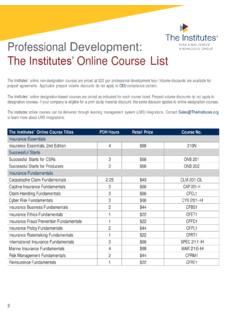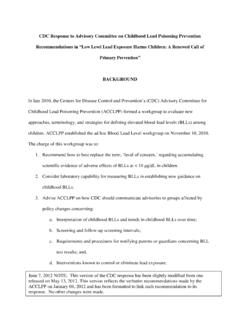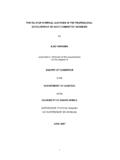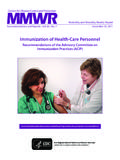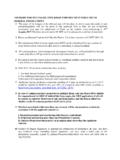Transcription of The Canons, Rules, and Guidelines of the CPCU …
1 2nd Edition 1st PrintingThe Institutes 720 Providence Road, Suite 100 Malvern, Pennsylvania 19355-3433 The Canons, Rules, and Guidelines of the cpcu code of professional conduct 2016 American institute For Chartered Property Casualty UnderwritersAll rights reserved. This book or any part thereof may not be reproduced without the written permission of the copyright otherwise apparent, examples used in The Institutes materials related to this course are based on hypothetical situations and are for educational purposes only. The characters, persons, products, services, and organizations described in these examples are fictional. Any similarity or resemblance to any other character, person, product, services, or organization is merely coincidental. The Institutes are not responsible for such coincidental or accidental material may contain Internet website links external to The Institutes.
2 The Institutes neither approve nor endorse any information, products, or services to which any external websites refer. Nor do The Institutes control these websites content or the procedures for website content Institutes specifically disclaim any implied warranties of merchantability or fitness for a particular purpose. No warranty may be created or extended by sales representatives or written sales materials. The Institutes materials related to this course are provided with the understanding that The Institutes are not engaged in rendering legal, accounting, or other professional service. Nor are The Institutes explicitly or implicitly stating that any of the processes, procedures, or policies described in the materials are the only appropriate ones to use. The advice and strategies contained herein may not be suitable for every is a registered trademark of The Institutes.
3 All rights Edition 1st Printing February 2016 ISBN 978-0-89463-872-5 The Canons, Rules, and Guidelines of the cpcu code of professional ConductThis material is published by The Institutes and is excerpted from the following material:Ethics and the cpcu code of professional ConductThe Institutes are leaders in property-casualty insurance education, research, and ethics. For more information on our professional certification programs, please contact our Customer Success Department at (800) Canons, Rules, and Guidelines of the cpcu code of professional ConductOVERVIEW OF THE cpcu code OF professional CONDUCTThe goals described in the Chartered Property Casualty Underwriter ( cpcu ) code of professional conduct s (the code ) Canons direct all CPCUs and cpcu candidates to always perform their professional activities ethically.
4 The minimum standards of conduct described in the code s Rules support the integrity of the cpcu designation. All CPCUs are obligated to meet the minimum standards outlined in the code . Failure to do so may subject a cpcu or a cpcu candidate to disciplinary measures. The code consists of Canons and Rules, as well as Disciplinary Rules and Procedures, to be followed when a Rule violation occurs. Purpose of the code of professional ConductThe purpose of the code is to clearly communicate the minimum standard of conduct expected for CPCUs and cpcu candidates. The code also out-lines the disciplinary process that will be followed to investigate alleged Rule violations. The code was introduced in 1976. Therefore, anyone who received their cpcu designation in 1976 or after is bound by it. Furthermore, most indi-viduals who received the cpcu designation before 1976 signed a statement agreeing to be bound by the code .
5 Only the American institute For cpcu is authorized to confer the cpcu designation. The American institute For cpcu confers the cpcu designa-tion upon individuals who have met the three requirements education, experience, and ethics established by its Board of Trustees. The Board of Trustees also can revoke the designation or otherwise discipline CPCUs who violate one or more Rules of the code . Revocation of the cpcu designation is the ultimate disciplinary action under the code . Lesser sanc-tions, such as a reprimand, may also be imposed, depending on the severity of the offense. Parties Affected by the CodeThe code applies to applicants, who are new cpcu students awaiting approval of their matriculation form and to candidates who have completed 2 The Canons, Rules, and Guidelines of the cpcu code of professional Conductthe matriculation process.
6 Finally, the code applies to designees and to CPCUs. If an individual s designation is revoked or suspended, that person is no longer considered a cpcu and is not permitted to use the cpcu designation. Designees or those waiting for conferment may also be referred to as CPCUs. ApplicantsA person must complete a matriculation form in order to be considered an applicant. People interested in obtaining the cpcu designation are encour-aged to matriculate when they begin the cpcu program, but they are not required to do so until they have satisfied the educational requirements. The matriculation form can assist in identifying an applicant whose eligibility as a cpcu candidate may raise ethical concerns. Such applicants are urged to matriculate as soon as possible in order to allow any potential issues of con-cern to be surfaced and resolved.
7 In cases involving serious ethical issues, a student s matriculation application is reviewed by Ethics Counsel, who may request additional information before accepting or rejecting the application. In some instances, an applicant s eligi-bility to become a candidate and take further cpcu exams may be suspended temporarily or indefinitely. cpcu CandidatesOnce the matriculation form has been approved, a cpcu candidate is bound by the code . Because cpcu candidacy has no term limits, a matriculated cpcu student remains a candidate until conferment of the designation, unless his or her conferment has been deferred or candidacy has been sus-pended or revoked. CPCUsAll CPCUs are bound by the code . The small number of CPCUs who received their designations before 1976 and chose not to be bound by the code are not subject to discipline or penalties under the code .
8 Components of the CodeThe code includes Canons and Rules regarding ethical standards of conduct . Advisory Opinions can be requested to assist in interpreting the various code provisions when a question arises. The code also includes Disciplinary Rules, Procedures, and Penalties that explain the process by which it is administered and enforced. The Canons, Rules, and Guidelines of the cpcu code of professional conduct 3 Canons and RulesThe Canons in the code establish standards of professional conduct . They also express the general concepts and principles from which the more specific Rules are derived. Each of the Canons is followed by one or more related Rules. Unlike the Canons, the Rules are mandatory and enforceable because sanctions may be imposed on any cpcu or candidate found guilty of a Rule violation.
9 The Rules prescribe the absolute minimum level of ethical conduct required of every cpcu , regardless of their occupation or position. Any individual subject to the code who violates a Rule faces the possibility of disciplinary action. In the absence of a Rule violation, violations of Canons do not consti-tute sufficient grounds for disciplinary action. The Rules attendant to Canon 8 incorporate by reference a set of Guidelines to assist CPCUs and candidates in interpreting Canon 8 s Rules regarding the use of the cpcu designation and the cpcu key logo. Individuals subject to the code are exposed to the possibility of disciplinary action for violations of these Guidelines that have been incorporated by reference into the Rules. For example, the Guidelines explain when it is appropriate to use the letters cpcu and where it is appropriate to display the cpcu key logo.
10 Advisory OpinionsCPCUs and candidates are strongly encouraged to request Advisory Opinions from the American institute For cpcu whenever substantial questions of interpretation arise. The Board of Ethical Inquiry (BEI) is an eight-member board, chaired by the Ethics Counsel, responsible for providing advisory opin-ions and for implementing, establishing, and approving cpcu ethics policy. Advisory Opinions may be either unpublished or published. Unpublished Advisory Opinions are informal and are issued by the BEI for the sole use of individuals to whom they are issued. Formal published Advisory Opinions are intended to be used by all persons subject to the code . Unpublished Advisory Opinions may eventually be published. For example, several unpublished Advisory Opinions were initially issued in response to individual questions regarding the appropriate use of the cpcu key logo and designation on web pages.
